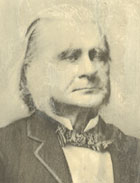Thomas Henry Huxley
Thomas Henry Huxley was a pioneering biologist and educator. Why does history remember him as ‘Darwin’s bulldog’?

Thomas Huxley (1825-1895)
Thomas Henry Huxley was one of the intellectual giants of the nineteenth century. Largely self-taught, he rose from humble beginnings to become a celebrated biologist, teacher, and promoter of science. Of all his achievements, he is best remembered for his spirited defence of Charles Darwin’s theory of evolution by natural selection. His staunch support has since earned him the nickname ‘Darwin’s bulldog’.
Work
From humble beginnings to great heights
Thomas Huxley was born in London in 1825, the son of an impoverished maths teacher. His intelligence and curiosity were evident from a young age. Despite spending only two years at school, he taught himself science, history, philosophy and German by reading books.
Huxley began a medical apprenticeship in 1840. Aged 21, he signed on as assistant surgeon on the HMS Rattlesnake, a Royal Navy ship assigned to chart the seas around Australia and New Guinea.
During the voyage, Huxley took the opportunity to collect and study marine invertebrates. He made exciting discoveries and sent the details back to England. On returning home in 1850 he found that his research had won him many admirers among the scientific establishment and a fellowship at the Royal Society.
In 1854 Huxley was appointed professor at the School of Mines in London. He continued to work incessantly as a scientist, teacher and writer for the rest of his life. Famed for his boundless energy, sharp wit and brilliant, questioning mind, Huxley became friends with many leading scientists of the day. His name is especially linked to one of those friends – Charles Darwin.
The big debate
Huxley’s friend Charles Darwin published The Origin of Species in 1859. In it he proposed the theory of evolution by natural selection. The theory provoked a storm of controversy because it was incompatible with the Christian belief that God created life on Earth. Huxley was certain Darwin was right and championed his work with a passion. It is for this that he is often called ‘Darwin’s bulldog’.
Huxley’s most famous defence of Darwin took place on 30 June 1860 in Oxford. The occasion was a public debate between Huxley and Samuel Wilberforce, the Bishop of Oxford. Wilberforce, like many members of the Anglican Church, was horrified by the suggestion that humans had not been created by God but was the descendant of apes. Before the meeting, Wilberforce was coached by the like-minded Richard Owen, an eminent Victorian scientist. Owen was Huxley’s archrival. He tried to make Wilberforce’s case as strong as possible.
Wilberforce gave his speech and then asked a question intended to ridicule the evolutionists – was Huxley descended from an ape on his grandfather’s or grandmother’s side of the family? Legend has it that Huxley whispered to a neighbour, ‘the Lord hath delivered him into my hands’. He then rose to his feet and delivered a stinging riposte: he was not ashamed of his ancestry, but ‘would be ashamed to be connected with a man who used great gifts to obscure the truth’.
Huxley had implied he would rather be related to an ape than a bishop. The audience were astonished at his audacity. Pandemonium ensued.
Huxley had acquitted himself well, but his battle with Owen was far from over. The two men continued to lock horns over the contentious issue of human origins. Owen claimed the human brain contained ‘unique structures’ not found in apes. Huxley collected evidence that proved him wrong, summing it up in Evidence on Man’s Place in Nature published in 1863. Owen had been defeated by Darwin’s tenacious ‘bulldog’.
‘As for your doctrines I am prepared to go to the Stake if requisite… I am sharpening up my claws and beak in readiness' Letter to Charles Darwin, regarding The Origin of Species
Huxley’s legacy
Huxley was much more than a great biologist. He pioneered a modern approach to education, encouraging science students to undertake practical work rather than relying on textbooks. He also invented the word ‘agnostic,’ using it to describe himself – a person who believes it is impossible to know whether or not God exists.
Huxley’s genius did not die with him. He founded a remarkable dynasty of scientists and thinkers including Julian Huxley, who established the World Wildlife Fund, and Aldous Huxley, a writer whose book Brave New World is still popular today.
‘Agnosticism simply means that a man shall not say he knows or believes that for which he has no grounds for professing to believe’
Timeline
| 1825 | Born 4 May, Ealing, London. |
|---|---|
| 1837 | Victoria becomes Queen. |
| 1846 | Huxley sails to Australia on HMS Rattlesnake. |
| 1850 | Huxley returns to England and is elected a Fellow of the Royal Society. |
| 1854 | Appointed lecturer at the School of Mines in London. |
| 1859 | Publication of Charles Darwin's The Origin of Species . |
| 1860 | The legendary encounter between Huxley and Wilberforce takes place on 30 June. |
| 1863 | Publication of Evidence on Man's Place in Nature. |
| 1868 | Publication of a classic essay, On a Piece of Chalk. |
| 1869 | Publication of An Introduction to the Classification of Animals |
| 1870 | Elected member of the new London School Board. |
| 1871 | Publication of A Manual of the Anatomy of Vertebrated Animals. |
| 1877 | Publication of A Manual of the Anatomy of Invertebrated Animals. |
| 1881-85 | Elected President of the Royal Society. |
| 1892 | Made Privy Councillor. |
| 1895 | Died 29 June, Eastbourne, England, after a long illness. |
Toolbox

Last year nearly 100,000 specimens were loaned to scientific institutions and researchers worldwide.